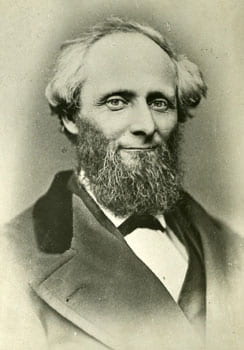Erastus Otis Haven
 President
President
1869 – 1872
Born:
November 1, 1820
Boston, Massachusetts
Died:
August 2, 1881
Salem, Oregon
Education: A.B., Wesleyan University (1842); D.D., Union College (1854); Honorary LL.D., Ohio Wesleyan University (1863)
Biography
Despite his brief tenure as president, Erastus Haven put his three years at Northwestern to good use. So much so, that the effects of his administration still reverberate today. This influential educator was a firm proponent of coeducation, with women and men learning together in an integrated educational and social environment.
Haven devoted his life to teaching, educational administration, and service to the Methodist Episcopal Church. After taking his degree from Wesleyan University in 1842, he accepted teaching and administrative positions at Methodist-affiliated secondary schools, the Amenia and Cazenovia (New York) seminaries. Haven began his ministerial career in 1848, holding local church appointments for five years, after which he accepted a professorship first of Latin and then of English literature and history—at the University of Michigan. During this time, as a noted orator, Haven traveled to various parts of the state to preach at Sabbath services, while many of his formal presentations on religious, educational, and political themes were published for wider circulation.
In 1856, Erastus Haven left teaching and relocated to Boston to take up the editorship of Zion’s Herald, an important denominational newsletter. Meanwhile, he was elected as a senator in the Massachusetts legislature, in which role he served as chairman of the Commonwealth’s General Committee on Education and as a member of the Board of Overseers of Harvard University. This taste of administration must have been a happy discovery for him, because in 1863 he returned to the University of Michigan, this time as the institution’s president. Haven remained there for six years when, in 1869, attracted by the promise and rapid growth of Chicago, he accepted an invitation to assume the presidency of Northwestern. A popular, well-respected administrator, it was surely to the disappointment of the Board of Trustees that Haven left Northwestern upon his election to the Board of Education of the Methodist Episcopal Church in 1872. As a dedicated Methodist and an administrator of vision, he was clearly attracted by the scope of his portfolio as Secretary of the Methodist board, holding an influential position from which he could draft policy governing a number of denominational institutions. But education was still in his blood, as two years later he accepted the chancellorship of Syracuse University, a position he held until his election to the Methodist episcopacy in 1880. As a bishop, Haven’s duties carried him far afield, to California and Oregon. It was in Salem, Oregon, that he died in 1881.
Haven was the author of several pedagogical texts including: The Young Man Advised, or Illustrations and Confirmations of Some of the Chief Historical Facts of the Bible (1855); Pillars of Truth: A Series of Sermons on the Decalogue (1866); Rhetoric: a Text-book Designed for Use in Schools and Colleges, and for Private Study (1869); Soul: a Positive Entity (1871); The National Hand-book of American Progress (1876). His Autobiography (C.C. Stratton, ed.) appeared posthumously in 1883.
Haven married Mary Frances Coles of New York in 1846. An Evanston street is named in his memory.
